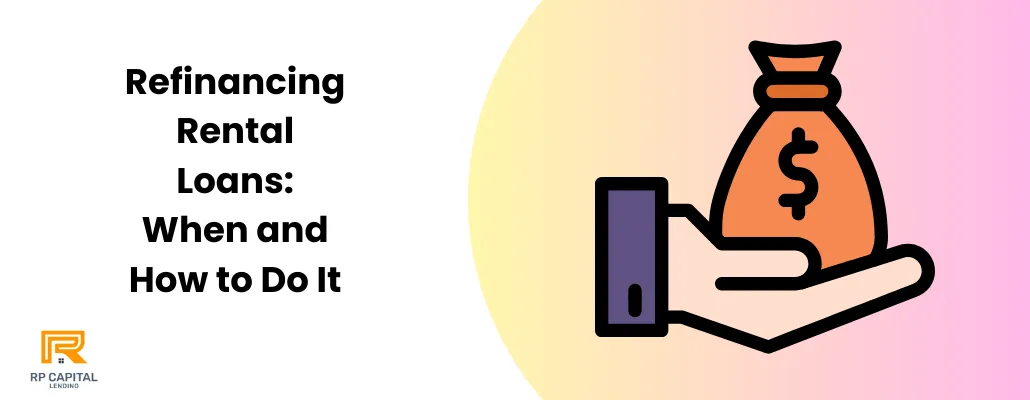Blog

Refinancing Rental Loans: When and How to Do It
Are you thinking about refinancing your rental property loan but unsure where to start?
Refinancing can be a powerful tool to lower your interest rates, reduce monthly payments, and improve your cash flow.
Let's dive into the world of rental loan refinancing and explore when and how to make the most of it.
What Is a Rental Loan?
A rental loan, also known as an investment property loan, is a type of mortgage specifically designed for purchasing or refinancing rental properties. Unlike traditional home loans, rental loans have distinct terms and conditions that cater to the financial and risk profiles of real estate investors.
Key Features of Rental Loans
Higher Interest Rates: Compared to primary residence mortgages, rental loans generally come with higher interest rates due to the increased risk lenders associate with investment properties.
Larger Down Payments: Lenders typically require a larger down payment for rental properties, often ranging from 20% to 30% of the property's purchase price. This higher equity requirement helps mitigate the lender's risk.
Stringent Qualification Criteria: Borrowers must often meet more stringent qualification criteria, including a higher credit score, a strong financial history, and evidence of sufficient cash reserves to cover mortgage payments during vacancies or unexpected expenses.
Property Condition and Appraisal: The condition of the rental property and its potential for generating rental income are crucial factors in the loan approval process. Lenders may require a thorough appraisal and inspection to ensure the property meets their standards.
Loan Types and Terms: Rental loans can come in various forms, including fixed-rate mortgages, adjustable-rate mortgages (ARMs), and interest-only loans. The terms can vary widely, so it's essential to choose a loan that aligns with your investment strategy and financial goals.
Understanding Rental Loan Refinancing
Refinancing a rental loan involves replacing your existing mortgage with a new one, typically at a lower interest rate. This process can help you save money, access equity, or modify the terms of your loan.
Benefits of Refinancing Rental Loans
Lower Interest Rates: Refinancing can significantly reduce your interest rate, saving you money over the life of the loan.
Reduced Monthly Payments: Lowering your interest rate or extending your loan term can lead to lower monthly payments.
Access to Equity: You can use the equity built up in your property for other investments or expenses.
Improved Cash Flow: With lower monthly payments, you'll have more cash flow to manage your property or invest elsewhere.
When to Consider Refinancing
Interest Rates Have Dropped: If current interest rates are lower than when you initially took out your loan, it might be a good time to refinance.
Improved Credit Score: A better credit score can qualify you for better loan terms.
Increase in Property Value: If your property's value has increased, you might access more favorable loan conditions.
Change in Financial Situation: Refinancing can help adjust your loan terms to better fit your current financial situation.
How to Refinance Your Rental Loan
Evaluate Your Current Loan: Understand your existing loan terms and conditions.
Check Your Credit Score: Ensure your credit score is in good shape to qualify for better rates.
Compare Lenders: Shop around for the best refinancing deals.
Gather Documentation: Prepare necessary documents like proof of income, property value assessments, and tax returns.
Apply for the Loan: Submit your application to your chosen lender and await approval.
Close the Loan: Once approved, review the new loan terms and close the loan.
Frequently Asked Questions
1. What are the costs associated with refinancing a rental loan?
Refinancing costs can include application fees, appraisal fees, and closing costs. It's important to compare these costs against potential savings to ensure refinancing is worthwhile.
2. Can I refinance if I have multiple rental properties?
Yes, you can refinance multiple rental properties, but each property may be subject to different terms and conditions. It's best to discuss options with various lenders.
3. How long does the refinancing process take?
The refinancing process typically takes 30 to 45 days, depending on the lender and the complexity of your loan application.
4. What is a cash-out refinance?
A cash-out refinance allows you to take out a new mortgage for more than you owe on your existing loan and pocket the difference, providing you with cash that can be used for other purposes.
5. Is it worth refinancing if I plan to sell the property soon?
If you plan to sell your property soon, refinancing might not be the best option due to the costs involved. However, if you can significantly reduce your interest rate or monthly payments, it might still be worth considering.
Conclusion
Refinancing your rental loan can be a strategic move to enhance your financial position. By understanding when and how to refinance, you can take advantage of lower interest rates, improved cash flow, and better loan terms.
RP Capital Lending is a d.b.a of RP Capital Partners Inc (NMLS # 2469193) | Privacy Policy
Copyright © 2022. All Rights Reserved.
Disclaimer: Loans only apply to non-owner occupied properties. Rates, terms and conditions offered only to qualified borrowers, may vary upon loan product, deal structure, other applicable considerations, and are subject to change at any time without notice.

